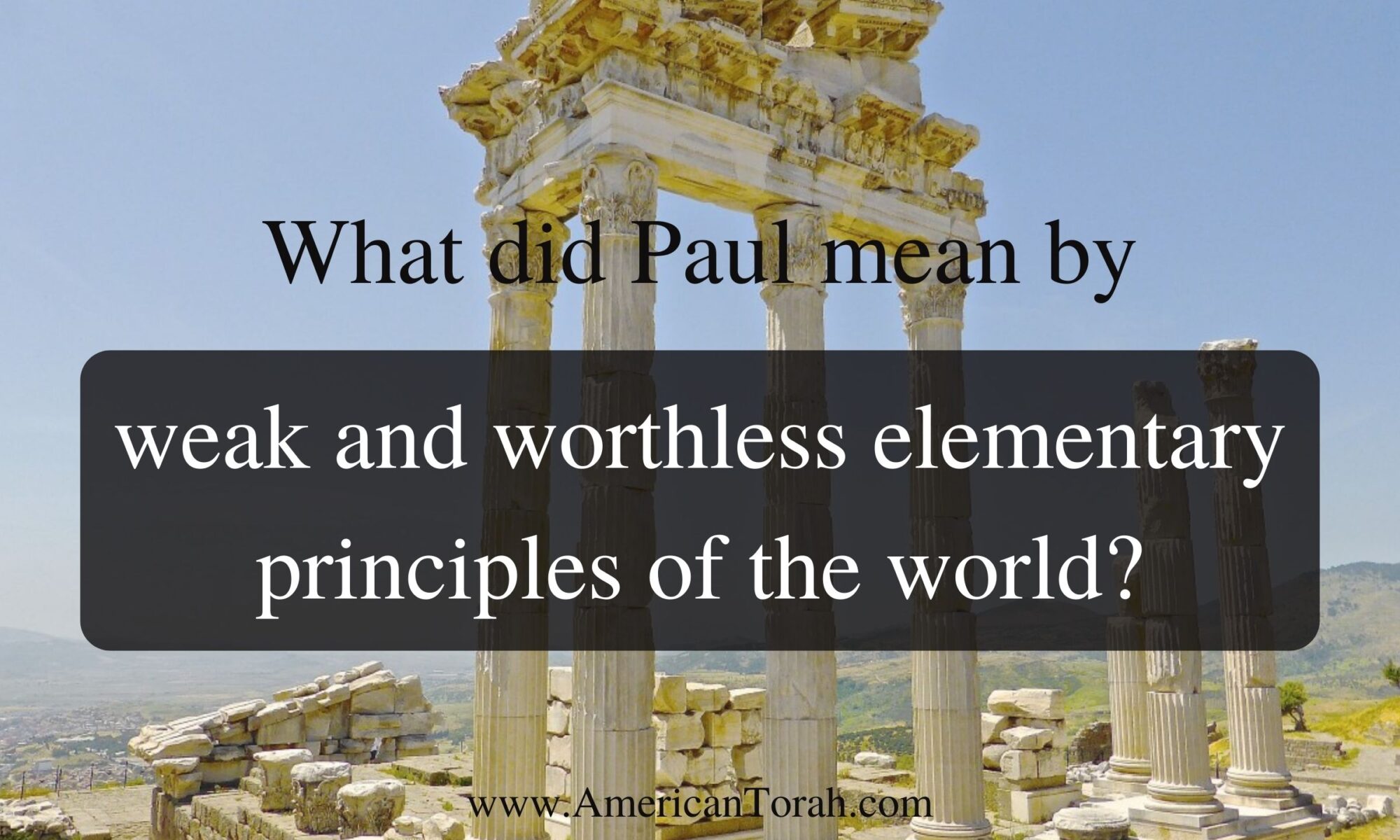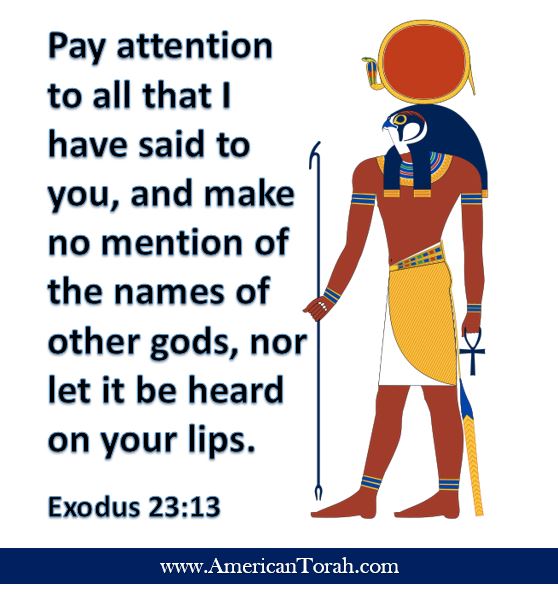Someone named Daniel made the following argument against believers in Yeshua being obedient to God’s Law as given through Moses:
Now that faith has come, we are no longer under the supervision of the law.
It doesn’t get any clearer than that.
How is it that you are turning back to those weak and miserable principles? Do you wish to be enslaved by them all over again?
-Daniel
Context, context, context. Modern Christians hear too many sermons and don’t do enough studying and thinking.
Daniel is alluding to a couple of Paul’s statements in the Letter to the Galatians, but he ignored the context and re-interpreted these statements to mean something other than what Paul intended. This isn’t entirely Daniel’s fault. His teachers all likely did the same thing. Here is the original passage:
Galatians 3:21-29 Is the law then contrary to the promises of God? Certainly not! For if a law had been given that could give life, then righteousness would indeed be by the law. (22) But the Scripture imprisoned everything under sin, so that the promise by faith in Jesus Christ might be given to those who believe. (23) Now before faith came, we were held captive under the law, imprisoned until the coming faith would be revealed. (24) So then, the law was our guardian until Christ came, in order that we might be justified by faith. (25) But now that faith has come, we are no longer under a guardian, (26) for in Christ Jesus you are all sons of God, through faith. (27) For as many of you as were baptized into Christ have put on Christ. (28) There is neither Jew nor Greek, there is neither slave nor free, there is no male and female, for you are all one in Christ Jesus. (29) And if you are Christ’s, then you are Abraham’s offspring, heirs according to promise.
Galatians 4:1-11 I mean that the heir, as long as he is a child, is no different from a slave, though he is the owner of everything, (2) but he is under guardians and managers until the date set by his father. (3) In the same way we also, when we were children, were enslaved to the elementary principles of the world. (4) But when the fullness of time had come, God sent forth his Son, born of woman, born under the law, (5) to redeem those who were under the law, so that we might receive adoption as sons. (6) And because you are sons, God has sent the Spirit of his Son into our hearts, crying, “Abba! Father!” (7) So you are no longer a slave, but a son, and if a son, then an heir through God. (8) Formerly, when you did not know God, you were enslaved to those that by nature are not gods. (9) But now that you have come to know God, or rather to be known by God, how can you turn back again to the weak and worthless elementary principles of the world, whose slaves you want to be once more? (10) You observe days and months and seasons and years! (11) I am afraid I may have labored over you in vain.
Paul Is Easy to Take Out of Context
By reading and quoting small bits of this letter out of context, Christians are able to say that the Law is irrelevant to them. Paul wrote that no one can be saved by keeping the Law, and many Christians point to that and say, “See? Paul said we don’t need to keep the Law.”
This is nonsense. It’s like saying we don’t need pens and paper to do our jobs because we didn’t need them to get to the office. Just because you don’t need to keep the Law to be saved, doesn’t mean you don’t need to keep the Law after you are saved. The conclusion simply doesn’t follow from the argument.
I am going to deconstruct this passage, paraphrasing and amplifying one piece at a time. First, I want to establish the reason that Paul included this discussion in his letter at all.
Galatians 1:6-7 I am astonished that you are so quickly deserting him who called you in the grace of Christ and are turning to a different gospel– (7) not that there is another one, but there are some who trouble you and want to distort the gospel of Christ.
After Paul had introduced the Galatians to faith in Yeshua, some other people came and began giving them a false teaching. But what was the false teaching? Rather than stating it outright, Paul summarized his own ministry of the past 20 years. He wrote of how he had once persecuted the Christians, but was converted by a miraculous encounter with Yeshua, after which he began preaching the gospel to gentiles. Many years later, some Pharisees had infiltrated the Christian congregations and were insisting that the gentiles should be circumcised and keep the whole Law before they could be considered true members of the congregation. Again he traveled to Jerusalem to confer with the apostles, and they agreed that salvation was not by circumcision and works, but by faith. James, Peter, and the other Disciples wrote a letter to the new Gentile congregations with four rules just to get them started in the right direction because “Moses is read aloud in every synagogue”.
That controversy was not about whether gentiles should keep the Law or learn it; it was only about justification, or salvation from sin. (See “Does Acts 15 Say We Can Ignore God’s Law” for a more detailed discussion of that event.) Later, Peter visited the congregation in Antioch. While there, he sat and ate with gentiles and Jews alike, but when some Jews arrived from Jerusalem, he stopped eating with the gentiles. Paul confronted him about it because Peter’s own vision had shown him that he should not hesitate to fellowship with gentiles. Besides that, there was nothing in the Mosaic Law to prevent a Jew from eating with a gentile. That was only a rule that had been invented by men and was never from God.
Galatians 2:15-21 We ourselves are Jews by birth and not Gentile sinners; (16) yet we know that a person is not justified by works of the law but through faith in Jesus Christ, so we also have believed in Christ Jesus, in order to be justified by faith in Christ and not by works of the law, because by works of the law no one will be justified. (17) But if, in our endeavor to be justified in Christ, we too were found to be sinners, is Christ then a servant of sin? Certainly not!
At this point Paul clearly established that he was not writing about living a good life of upright behavior, but about eternal spiritual justification, about salvation: “We know that a person is not justified by works of the law but through faith in Yeshua the Messiah.”
Paul said that, even though he and the apostles were Jews, they knew that they were saved in the same way as the gentiles: through faith in Yeshua, and not by works of the law. But as James pointed out, this did not stop them from keeping the Law, only in relying upon it for their salvation (James 2:18).
Galatians 2:18-19 For if I rebuild what I tore down, I prove myself to be a transgressor. (19) For through the law I died to the law, so that I might live to God.
This thing that Paul is writing against is the same thing that he had previously torn down, but what was that thing? Not the Law itself as he repeatedly pointed out in the Letter to the Romans, but rather the legalism of attempting to earn salvation through obedience to the Law, especially to man-made laws that frequently ran counter to God’s Law. To go back to depending on the Law for salvation when it was never sufficient either before or after the cross would be counterproductive in the extreme.
Having established that the controversy in Galatia was not about how people ought to live, but how they are to be saved, let’s skip ahead to the passage that Daniel quoted.
What Was Galatians Really About?
Galatians 3:21 Is the law then contrary to the promises of God? Certainly not! For if a law had been given that could give life, then righteousness would indeed be by the law.
There is no conflict between Law and Grace if they are both used properly. God’s promise of salvation is alluded to in the Law, but is not provided for by the Law. Put another way, the Mosaic Law was never intended to save anyone from sin that has already been committed. There are provisions in it for enabling sinners to approach God despite their sin, but there is no provision to permanently remove that sin. That was never its purpose.
Total righteousness–the complete absence of sin–is not possible under the Mosaic Law and never was. Of course, there is another kind of righteousness that comes from obedience to the Law, unless Moses was lying in Deuteronomy 6:25, but that is not the righteousness that Paul was addressing here. It is has value, but all of the law-abiding righteousness in the world can’t erase a single instance of law-breaking. In Galatians 3:21, Paul was discussing to a greater righteousness that goes beyond mere actions of the flesh.
(22) But the Scripture imprisoned everything under sin, so that the promise by faith in Jesus Christ might be given to those who believe.
The Scriptures written on stone and parchment would not have been necessary if we were able to maintain God’s standards perfectly. It’s very existence proves that we are imperfect. Because we are sinners, God gave us the Law to teach us how to behave, and also to serve as a witness and judge against us in our sins. When we sin, the Law testifies against us, and we come under its authority to condemn. If it weren’t for the written Law, many people would not even know that they were “imprisoned” by it because of their sin and would be unaware that they needed a savior. For those who become aware of their need, God has also made promises of redemption in the same document.
(23) Now before faith came, we were held captive under the law, imprisoned until the coming faith would be revealed.
Paul did not mean that faith came at a particular moment in time for all people everywhere. Faith did not come after Yeshua’s crucifixion or even after Pentecost. If it did, then Abraham’s faith could not have been counted as righteousness (Galatians 3:6). Faith has come to individuals in all ages. Enoch, Moses, David, and Paul were all saved by faith and set free from the condemnation that came from their guilt under the Law. Those who have not yet found faith in Yeshua are still held captive to the Law because their failure to obey it, keeps them under its authority to condemn.
The Law As a Schoolmaster
(24) So then, the law was our guardian until Christ came, in order that we might be justified by faith.
The Greek word paidagogos is translated as guardian, schoolmaster, or tutor, depending on the translation you’re reading. According to David Stern (Jewish New Testament Commentary), the paidagogos functioned as a disciplinarian who ensured children arrived at their school safely and on time. Because the paidagogos does not exist in our culture, none of those translations are quite right. Young’s Literal Translation renders it as “child-conductor,” which is probably as accurate as one could hope for.
I think the King James Version is very instructive here.
(24) Wherefore the law was our schoolmaster to bring us unto Christ, that we might be justified by faith.
Notice that “to bring us” is in italics, which means that those words were not in the original Greek text. They were inserted by the translators to help the reader understand what they believed the passage to be saying. The added words don’t detract from the meaning in the KJV, but the English Standard Version, from which I have been quoting throughout this series, is misleading in this case, especially because it doesn’t include the italics. The ESV translators (as well as the International Standard translators) took a huge liberty with this verse, contrary to almost every translation before them. The Rheims New Testament, Bishops Bible, and Geneva Bible (all 16th century) agree with the KJV. So does the American Standard, Darby, and Young’s translations (all 19th-20th century).
The Law was not a paidagogos until Christ, but unto Christ. The difference in prepositions is very important. The Law leads us to the Messiah by illustrating the principles that require a savior, by demonstrating our inability to save ourselves, and by prophesying of his coming, not to mention the many, many allusions to the Messiah’s role in the physical and spiritual salvation of Israel. To this day, the Law continues to function as a “schoolmaster unto Christ” for everyone who doesn’t yet know him.
(25) But now that faith has come, we are no longer under a guardian, (26) for in Christ Jesus you are all sons of God, through faith.
Paul’s illustration of the paidagogus is a metaphor, and it’s always important not to add more meaning to any metaphor than the author intends. Since Paul only said that the Law is like a paidagogus in the sense that it leads us to Christ, we abuse the text by trying to make it say that the Law functions as a paidagogus in every conceivable circumstance.
Now that the Law has demonstrated our need for salvation and shown us the way to obtain it, we no longer need it for that purpose. This is not to say that we don’t need the Law for other purposes. Having come to faith, we are not to go on sinning.
We know that the Law defines sin.
Peter, John, and Paul all explained that one of the purposes of the Law is to show us our sin. If it didn’t define sin, how could neither convict us or inform of our need for a savior? If something was a sin before faith, it makes no sense to think it somehow becomes not sin after faith. Having “put on Christ” (v27), we are not allowed to rely on his covering to hide continuous sin. We are required to continue striving for perfection, not to earn salvation, but because righteous behavior is pleasing to God.
The great benefit of faith in this regard is that it removes any worry of failure. We obey out of love for our Savior, but we don’t need to be terrified of instant condemnation if we fail in any small point, because we know he will forgive us when we sin.
I am going to skip a few verses to make a couple of final points.
Elementary Principles of the World
Galatians 4:8-9 Formerly, when you did not know God, you were enslaved to those that by nature are not gods. (9) But now that you have come to know God, or rather to be known by God, how can you turn back again to the weak and worthless elementary principles of the world, whose slaves you want to be once more?
What are these “weak and worthless elementary principles of the world” to which the Galatians were once enslaved? We can’t know the specifics of what they were, but we can know for an absolute certainty that they were not God’s Laws as Daniel implied in his comment. The Galatians were very much enslaved to the Law, but only because they were sinners, not because they were trapped in Pharisaical Judaism.
The answer is only a single sentence away, and I am astonished that any Christian who has actually read Galatians can think Paul was referring to Torah! Those “weak and worthless elementary principles of the world” were false gods and religions, not God’s Law! Verse seven says, “Formerly, when you did not know God, you were enslaved to those that by nature are not gods.”
Indeed, Daniel, it doesn’t get any clearer than that.
The Galatians were pagans before they came to faith in Yeshua, not Jews. How could they return to a Judaism that they had never known? When Paul wrote that they were turning back to those former principles, he meant that by attempting to earn their salvation by works, they were returning to the same principles that had informed their former idolatry. When they were idol worshipers they appeased their gods by speaking the right incantations and offering the right sacrifices on the right days.
What Is the Law to a Christian?
There was never any eternal salvation in such things whether they originated in pagan idolatry or in God’s perfect Law. You cannot be saved through the rigorous observance of days, months, seasons, and years no matter what days or seasons they are.
You can, however, learn a great deal about who God is and how he relates to you by keeping his commands, including his holy days.
Hosea 4:6 My people are destroyed for lack of knowledge; because you have rejected knowledge, I reject you from being a priest to me. And since you have forgotten the law of your God, I also will forget your children.
So this Spring, try removing unleavened bread from your house during the week of Passover. This Fall, get yourself a family sized tent and find a group of people celebrating the Feast of Tabernacles. Or build yourself a sukka.
Love God and love your neighbor. God’s Law, the Torah, shows you how to do that.
Study, do, and live. Obeying God’s instructions will never steer you wrong. By definition, keeping the commandments can never be sin.






